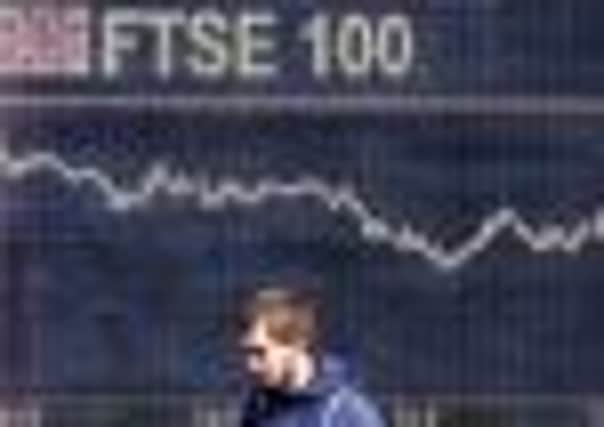Tom Miers: Is the British economy actually improving?


The mystery deepens. Why is unemployment falling so dramatically when the economy is supposed to be shrinking? This is the puzzle that is confounding economists and statisticians across the land. And the muddle could have a big impact on the next election.
Yesterday it was announced that unemployment fell by 46,000 across the UK in the three months to June, down to a rate of 8 per cent. Some of the fall may be due to temporary work created for the Olympics, but it was also part of a wider trend. In Scotland, for instance, the picture is even brighter: a fall to 7.9 per cent, the fifth successive month that the jobless total has declined.
Advertisement
Hide AdAdvertisement
Hide AdOverall, unemployment is still much too high for comfort, but considering we are meant to be enduring the worst economic crisis since the 1930s, the labour market is performing spectacularly.
Since 2010, nearly a million private sector jobs have been created, twice the number of those lost from public sector cuts. Total employment is now just 0.3 per cent below its pre-recession peak.
Given the dire figures for the economy as a whole – output is still 4.5 per cent below peak and worsening – you would have thought that unemployment would be well above the totemic three-million figure that it breached in the 1980s.
So what on earth is going on?
Part of the reason is that the labour market is functioning more efficiently. Instead of shedding jobs, companies have been able to persuade workers to moderate pay. Many businesses work with self-employed contractors instead of hiring employees on fixed contracts. This allows them to adjust the amount of labour they take on by reducing hours rather than sacking people. Alternatively, employers build adjustable bonuses into pay packages, which means that salaries can be reduced without laying people off.
Unions claim that these trends imply a loss of job security. The balance of risk in the labour market is shifting from employer to worker. But it’s better to have a part-time job than no job at all. The shift to more flexible working practices means that valuable skills are retained and the habit of work maintained for hundreds of thousands who would otherwise be on the dole. Compared with Spain or Greece, where unemployment stands at 25 per cent (50 per cent for the young), Britain is doing well.
Which makes the official figures on growth all the more surprising. According to the Office for National Statistics, the economy shrank by 0.7 per cent in the second quarter of the year. This compares with a 0.2 per cent decline for Spain, where unemployment is soaring. Not all of the mismatch can be explained by flexible working. The total number of hours worked has also increased strongly, by 2.3 per cent in the last year. So the figures, if they are correct, imply a massive loss of productivity. If an economy is shrinking while still putting on jobs, then the people in work must be working a lot less effectively. But this doesn’t make much sense as an explanation. We are witnessing a big transfer of jobs from the public sector (where productivity falls every year) to the private sector, where it tends to rise. It seems implausible that this trend should be compatible with an overall loss of efficiency.
Many economists are coming to the conclusion that the figures are simply wrong. The ONS growth figures seem at odds not just with unemployment data but with business surveys that point to modest (if patchy) improvements in order books and confidence. Exports, services and manufacturing have all recorded decent figures in recent months. Even the construction sector is recovering after the collapse of the pre-recession housing and public spending booms. Meanwhile, recent falls in inflation are slowly closing the gap between prices and pay increases, improving household finances and spending power.
The mismatch in official data throws policymaking into confusion. Should the Bank of England loosen monetary policy even further in response to the double dip? Or is it time to bring a halt to its money-printing (and savings-destroying) programme of quantitative easing? Should the government switch to a “Plan B”, as its opponents urge, or is austerity finally bearing fruit?
Advertisement
Hide AdAdvertisement
Hide AdI feel sorry for the politicians. The ONS data on growth has a worrying track record that could almost be designed to flummox ministers. Its numbers are often subject to dramatic review as more concrete data becomes available, sometimes many months after the initial release of the estimated figures. The last Labour government went into the 2010 election on the back of dreadful figures showing the UK in recession in the second half of 2009. These have subsequently been revised to show modest growth in that period.
The current economic gloom is placing enormous pressure on the coalition, and could easily have dramatic political consequences. Either coalition partner could decide its fortunes would be better unhitched from the other, or else the economic news could provoke an unwarranted change in policy. The very outcome of the next election could be decided on a batch of dodgy figures from the ONS.
What is worse, the economy itself could suffer from a self-fulfilling prophecy of economic woe. A number of business organisations have predicted that unemployment could start to rise if the recession appears to deepen once more. Companies that have been holding on to skilled staff in anticipation of an increase in demand might let them go if that prospect diminishes. It would be a tragedy if the country experienced another economic slump for fear of a statistical mirage.